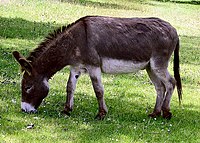
Photo from wikipedia
Donkeys (Equus asinus) face a global crisis. The health, welfare, and even survival of donkeys are being compromised as the demand for their skins increases. It is driven by the… Click to show full abstract
Donkeys (Equus asinus) face a global crisis. The health, welfare, and even survival of donkeys are being compromised as the demand for their skins increases. It is driven by the production of ejiao, a traditional Chinese remedy believed by some to have medicinal properties. It is estimated that the ejiao industry currently requires approximately 4.8 million donkey skins per year. Since there is no productive chain for donkey skin production outside of China, the activity is extractive and has resulted in the decimation of donkeys. Gestation is 12 months in donkeys, increasing the risk of extinction if such practices are not controlled. In this scenario, the donkeys are collected (purchased for low prices, stolen, and collected from the side of the roads) and are then often transported for long distances, usually without water, food, or rest. The trade, in Brazil, poses significant biosecurity risks, particularly because examinations are rarely conducted and therefore infectious diseases, such as glanders and infectious anemia, remain undetected. Furthermore, in chronic stress situations, the immune system is suppressed, increasing the biosecurity risk, especially because donkeys are a silent carrier of diseases. Rarely there is traceability with animals from different origins being put together in “fake farms”, before being delivered to slaughterhouses. The opportunistic strategy of collecting animals, or buying for low prices, keeping them without access to food and veterinary assistance, is what makes this trade profitable. Our experience in donkey welfare and the global skin trade suggest that it will be enormously challenging and cost-prohibitive to run a trade at the standards required to be considered humane, sustainable, and safe. Although donkeys are being blamed for the involvement in road accidents, it is not an ethical solution to maintain this trade as an alternative. Moreover, the ecological role of donkeys in native ecosystems has not been elucidated, and some studies indicate they could even have a positive effect. Regardless of the future the donkeys will have; we must guarantee a life with the least dignity to the animals under our responsibility.
Journal Title: Brazilian Journal of Veterinary Research and Animal Science
Year Published: 2021
Link to full text (if available)
Share on Social Media: Sign Up to like & get
recommendations!